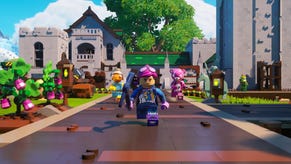Gamigo's Ralph Frefat
The rise of online games, and why a €10 million investment could move the goalposts
Honestly, in the past it was true. If you look back four or five years there was a lack of quality. But if you look at the future, we've signed a space-opera game that has a development cost of €10 million, and the game looks like it should be published by Electronic Arts.
This is the future of free-to-play - it doesn't mean that it's a cheap experience, just because it's free to the consumer. The game is the same kind of quality that you're used to getting at retail.
People are searching for it. They want these games - they look at Google to find them. For every company - it doesn't matter if it's browser games or client games - the majority of new consumers come via Google, via direct advertising.
And there are also websites that are just reporting on free-to-play - so you can find this information. Type into Google: "Free-to-play fantasy game" and you will get a lot of nice games, which you can try.
But it's getting tougher and tougher, because there's more competition, so it's harder to be found on the internet.
It depends on several things - on the lifetime, the ARPU, on how many players you can get into the game that are playing actively and purchasing.
But compare it with retail - if you have a big game there, you have a time frame of let's say 8-10 weeks when the game is hot, before it drops. The lifecycle of a normal free-to-play online game is 3-5 years, so I don't care if it's not that successful in the first six months - it might be in the next four.
If you summarise the revenues that we did with certain games, even if you just make €100,000 per month, add all that up over a lifetime and it's much more than some retail games make.
I can tell you, we're not sure if we'll get that money back - but it helps us in terms of public awareness. The game looks so awesome that everybody is willing to report on it. It's called Black Prophecy, and it's out towards the end of this year.
You have a completely different approach to your customers, compared to retail. But let me go back one step - when we're looking at whether or not we'll make back that €10 million, we can do that because of our portfolio.
It's a mix of opportunities and risks - we also have browser games that don't even cost €1 million, just a few hundred thousand, and we'll make that money back in the short term. It's a mixed calculation.
Ralph Frefat is director of media partnerships at Gamigo. Interview by Phil Elliott.






.jpeg?width=291&height=164&fit=crop&quality=80&format=jpg&auto=webp)

